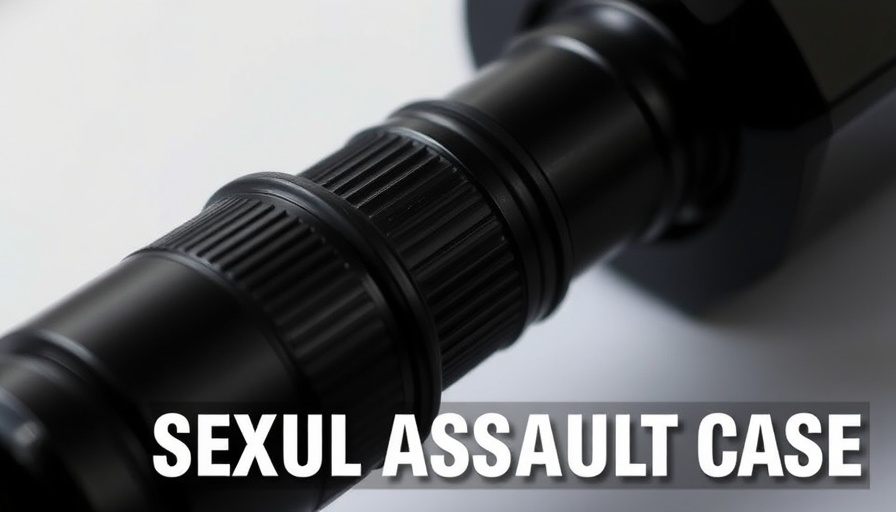
Shocking Allegations on Trust and Authority
The recent news of Jerome Younger, a 54-year-old assistant principal from Detroit, facing grave charges of sexual assault involving a minor, has left the local community in shock. Younger, who worked at Edward Duke Ellington Conservatory at Beckham Academy, was arrested in connection with the alleged incidents that took place in Roseville. These accusations raise critical questions about the safety of minors in educational settings, especially when those entrusted with their education and mentorship may not uphold the integrity expected of them.
In 'Detroit assistant principal charged with sexual assault,' we delve into the alarming situation surrounding Jerome Younger, sparking critical discussions about safety and trust in educational environments.
The Gravity of the Charges
Younger is accused of first-degree criminal sexual assault, a charge that carries the possibility of life imprisonment. This disturbing turn of events hit the airwaves with a heavy emotional weight. Local residents expressed outrage and disbelief, making it clear that such allegations against a trusted educator are not just shocking; they are utterly damaging to the fabric of community trust. The intricacies of this case remain to be fully unraveled as the investigation proceeds, but clear implications about the trust placed in public figures like educators have been raised.
A Pattern or an Isolated Incident?
While there is only one confirmed victim at this point, authorities suggest there may be more individuals who have been affected, evoking a sense of urgency for those potentially victimized to come forward. Eyewitness accounts indicate that Younger has lived a reclusive life, rarely interacting with his neighbors. The lack of a social circle raises further questions about his behavioral patterns and whether there could have been signs that were overlooked. Neighbors described him as a “hermit,” someone who kept to himself and hardly left his home. This quiet demeanor now casts a disturbing light on the alleged acts.
Parental Concerns Heightened
This situation brings grave concerns to parents and guardians across Metro Detroit, straining the trust built between families and the education system. Parents naturally want to provide their children with safe and enriching experiences, but moments like these can severely shake that confidence. As the legal proceedings unfold, many parents are prompted to rethink their approach to discussing personal safety with their children, sparking further community conversations about what accountability and transparency look like in educational institutions.
Institutional Responsibility
Detroit Public Schools have yet to respond officially to the allegations against Younger, but the questions surrounding their oversight are increasing. How are educational institutions safeguarding minors? What protocols are in place to prevent such violations of trust? With years of involvement in mentoring through the Junior Police Cadet program, the gravity of these charges cannot be downplayed, and there is a growing demand for reforms that ensure comprehensive background checks, regular training, and open communication channels for students to report inappropriate behavior without the fear of repercussions.
Broader Implications for Educational Communities
The implications of this case extend beyond the one individual and can potentially reshape the narrative around educators in Michigan. The risks of allowing unchecked authority within schools must be addressed through community collaboration with educational administrators. This incident should serve as a catalyst for broader conversations about systemic safety in schools, bolstering education reform initiatives aimed at protecting vulnerable populations.
What’s Next for the Community?
This unfolding situation not only affects the direct parties involved but touches upon all aspects of public safety, education, and community trust across Michigan. How the legal system handles this case may set precedents for future accountability measures. As the community grapples with these shocking events, they are urged to remain vigilant and proactive in advocating for safety while fostering environments conducive to open dialogue about sensitive topics.
The Importance of Advocacy and Reporting
As the investigation continues, it is crucial for individuals who may have experienced similar situations to come forward. Advocacy groups recommend that victims have access to confidential resources to discuss their experiences safely. Community support can be pivotal in helping those affected find their voice, ensuring that such deceptions of trust are swiftly addressed and can be met with supportive measures that help survivors seek counsel and justice.
In the end, trust, accountability, and support build the foundation for a safe educational environment for all children. It is essential, now more than ever, to encourage open communication between educators, parents, and students to foster an environment where all individuals feel safe and valued.
 Add Row
Add Row  Add
Add 



Write A Comment